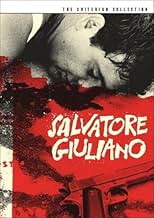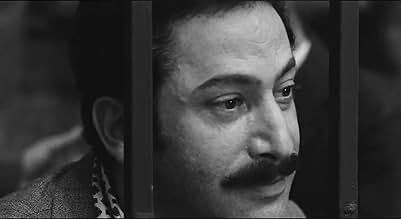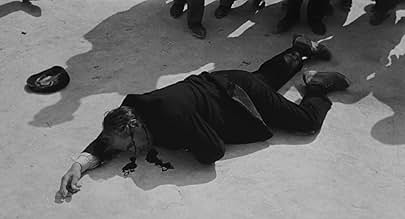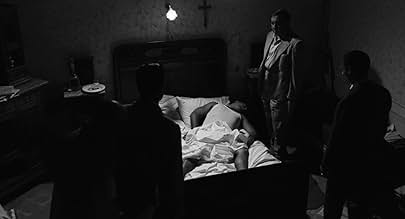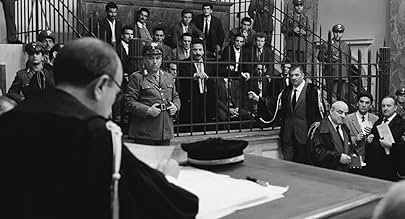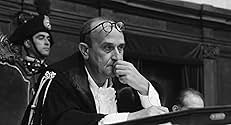IMDb RATING
7.3/10
5.4K
YOUR RATING
The unclear and complicated twists between governal powers, independentist party and Mafia in the Sicily of the '40s culminate with the death of Salvatore Giuliano.The unclear and complicated twists between governal powers, independentist party and Mafia in the Sicily of the '40s culminate with the death of Salvatore Giuliano.The unclear and complicated twists between governal powers, independentist party and Mafia in the Sicily of the '40s culminate with the death of Salvatore Giuliano.
- Awards
- 6 wins & 4 nominations total
Frederico Zardi
- Pisciotta's Defense Counsel
- (uncredited)
Pippo Agusta
- Minor Role
- (uncredited)
Sennuccio Benelli
- Reporter
- (uncredited)
Giuseppe Calandra
- Minor Official
- (uncredited)
Pietro Cammarata
- Salvatore Giuliano
- (uncredited)
Max Cartier
- Francesco
- (uncredited)
Nando Cicero
- Bandit
- (uncredited)
Pietro Franzone
- Seperatist
- (uncredited)
Giovanni Gallina
- Bit Part
- (uncredited)
Vincenzo Norvese
- Bit Part
- (uncredited)
Carmelo Oliviero
- Don Nitto Minasola
- (uncredited)
Renato Pinciroli
- Pinciroli
- (uncredited)
Francesco Rosi
- Narrator
- (voice)
- (uncredited)
Giuseppe Teti
- Priest of Montelepre
- (uncredited)
Cosimo Torino
- Frank Mannino
- (uncredited)
Featured reviews
Interesting neo-realistic, quasi-documentary film with notable editing. But did the film deserve the Best Director award at Berlin over Bergman's "Through a glass darkly"? The Swedish film was superior. Martin Scorsese likes it because he can identify with the Italian politics and sociology of that time. The Rosi film is good but overrated.
This remarkable movie reminded me of early Eisenstein for the fluid, dynamic
movement of crowds--in the streets, in the movement of soldiers and bandits across the hilly terrain, and in the scene of the Portella della Ginestre massacre. The back-and-forth narrative structure must have influenced Costa-Gavras in the making of "Z." And Rosi's ability to get riveting performances from non-professionals (some of whom could not read scripts) is astonishing. The story line gets confusing, but I think that's because the situation was confusing--multiple betrayals and layers of
corruption and complicity--rather than a flaw in the script or editing. Visually exciting, too--the use of distancing overhead shots, the quiet menace of gunmen walking up a deserted, sun-baked street... memorable stuff.
movement of crowds--in the streets, in the movement of soldiers and bandits across the hilly terrain, and in the scene of the Portella della Ginestre massacre. The back-and-forth narrative structure must have influenced Costa-Gavras in the making of "Z." And Rosi's ability to get riveting performances from non-professionals (some of whom could not read scripts) is astonishing. The story line gets confusing, but I think that's because the situation was confusing--multiple betrayals and layers of
corruption and complicity--rather than a flaw in the script or editing. Visually exciting, too--the use of distancing overhead shots, the quiet menace of gunmen walking up a deserted, sun-baked street... memorable stuff.
A perfect analysis of the most famous gangster, loved from the poor people, of Sicily. Is very good the acting of Frank Wolff as the cousin of Giuliano, Salvatore Pisciotta. On this Film there is the same history of the gangster of the Film "Il Siciliano" with C. Lambert, but here the film is history, there the film is a bad novel.
Francesco Rosi's cinema are around political matters, a tough subject too swallow for usual cinephiles, due the hard life which we lives are enough to stand, but some facts needs a better understanding as this picture suggests, how Sicily gets his independence from Italy is plentiful explained here, each facts were expose in this overlong picture, but Francesco wisely put forward a cursed triangle of forces, the mob, the separatists and the dangerous outlaws who help them in hope to get their crime's amnesty, after they got Sicily's autonomy starts another hard issue, the communist, such thing was totally inconceivable to Italian standards at it's time, a mass killing was prompt provides by the rich farmers and also by the mob, the Giuliano the leader almost didn't appears on the movie, his second on command and your fellows conrades in-arms were charged by the massacre, interesting picture over this dry land on Italy's south, the mountainous island Sicily !!!
Resume:
First watch: 2019 / How many: 1 / Source: DVD / Rating: 8
Resume:
First watch: 2019 / How many: 1 / Source: DVD / Rating: 8
Francesco Rosi's elliptical film about the notorious Sicilian gangster is quite stunning. This is not, however, a typical gangster film. This film is more about the lives of the people affected by Giuliano than about the gangster himself and this is given extra resonance by the casting of the real villagers in almost all cases. The fact that we never see Giuliano's face makes the director's intentions quite clear.
Giuliano began his professional criminal career when he was caught stealing at a young age and chased out of his village into the surrounding hills where he formed a gang and made a living from robberies and standover tactics. He became feared and respected by the locals and was eventually recruited by regional officials to help in the fight for independence from Italy. The first half of the film explores these events and manages to convey an extremely strong feeling for the time and place. The second half of the film deals with the trial of the surviving members of Giuliano's gang after his death and in doing so illuminates much of what has come before.
It is remarkable how well the film holds together considering the amount of different styles and techniques that were combined in its creation. There are elements of docudrama, courtroom drama, Italian neorealism, crime story and political tract. It is also surprising how well it holds up over forty years later.
Giuliano began his professional criminal career when he was caught stealing at a young age and chased out of his village into the surrounding hills where he formed a gang and made a living from robberies and standover tactics. He became feared and respected by the locals and was eventually recruited by regional officials to help in the fight for independence from Italy. The first half of the film explores these events and manages to convey an extremely strong feeling for the time and place. The second half of the film deals with the trial of the surviving members of Giuliano's gang after his death and in doing so illuminates much of what has come before.
It is remarkable how well the film holds together considering the amount of different styles and techniques that were combined in its creation. There are elements of docudrama, courtroom drama, Italian neorealism, crime story and political tract. It is also surprising how well it holds up over forty years later.
Did you know
- TriviaMartin Scorsese credits this film as being one of his many inspirational sources for the look and style of his Taxi Driver (1976).
- GoofsWhen his mother comes to view and identify his corpse, Salvatore's stomach clearly moves as the actor struggles to control his breathing.
- ConnectionsEdited into Il sasso in bocca (1970)
- How long is Salvatore Giuliano?Powered by Alexa
Details
- Release date
- Country of origin
- Language
- Also known as
- Wer erschoß Salvatore G.?
- Filming locations
- 98 Via Serafino Mannone, Castelvetrano, Trapani, Sicily, Italy(Giuliano's body)
- Production companies
- See more company credits at IMDbPro
- Runtime2 hours 3 minutes
- Color
- Sound mix
- Aspect ratio
- 1.85 : 1
Contribute to this page
Suggest an edit or add missing content

